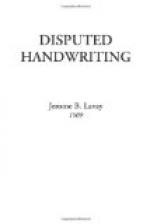Like speech or gesture, handwriting serves as a means for the expression of thought; and in expressing our thoughts we give expression to ourselves. When once the art of writing is learned we are no longer conscious of the mental and manual effort required to form the letters. It becomes, as it were, a second nature to us. We do it mechanically, just as we form our words when talking, without realizing the complex processes of mind and muscle that it involves.
Of course, the style of handwriting does not in every case remain the same throughout the entire life of a man or woman. A man of fifty may not write the same hand that he did when he was eighteen or twenty, and if he lives to be eighty or ninety it will in all probability show further indications of change. This fact only emphasizes the relationship between handwriting, character, and personality; for it will always be found that where there is a change in the style of penmanship there is a corresponding change in the person himself. Very few of us retain the same character, disposition, and nature that we had in youth. Experience and vicissitudes do much to modify our natures, and with such modifications come alterations in our handwriting. In some persons the change is very slight, while in others it is noticeably evident.
When a man attempts to change his style of handwriting he simply alters the principal features of it. If his writing normally slopes to the right, he will probably adopt a back-hand. He may also use a different kind of pen; may change the size of the writing, alter the customary formation of certain letters, and add certain unfamiliar flourishes. But knowing nothing about the many minor characteristics of his natural writing he unconsciously repeats them, notwithstanding his best efforts to veil the identity of his chirography. In this respect he resembles the actor, who, while he may assume all the outward characteristics of another individual, still retains certain personal peculiarities of which he is himself unaware and which render it impossible for him to completely disguise his own individuality.
The introduction of cheap postage and the immense increase of every-day correspondence has ruined handwriting and banished forever the art of composition. The short, modern, business-like letters of to-day will not bear comparison with the neat, voluminous letters full of graphic scenic descriptions, which our forefathers were wont to compile, and were worth keeping and rereading. Now, when similar correspondence is undertaken, it is dictated to a stenographer, copied on a typewriter, or printed, for few people will take the trouble to read manuscript composition of any kind. Looking backward, we find a marked paucity of ideas and carelessness of writing in correspondence, getting worse the farther back we go. Few letters are preserved these days, except those on business, which is a pity, for a letter is always a unique production, being a correct reflect of a writer and his times.




